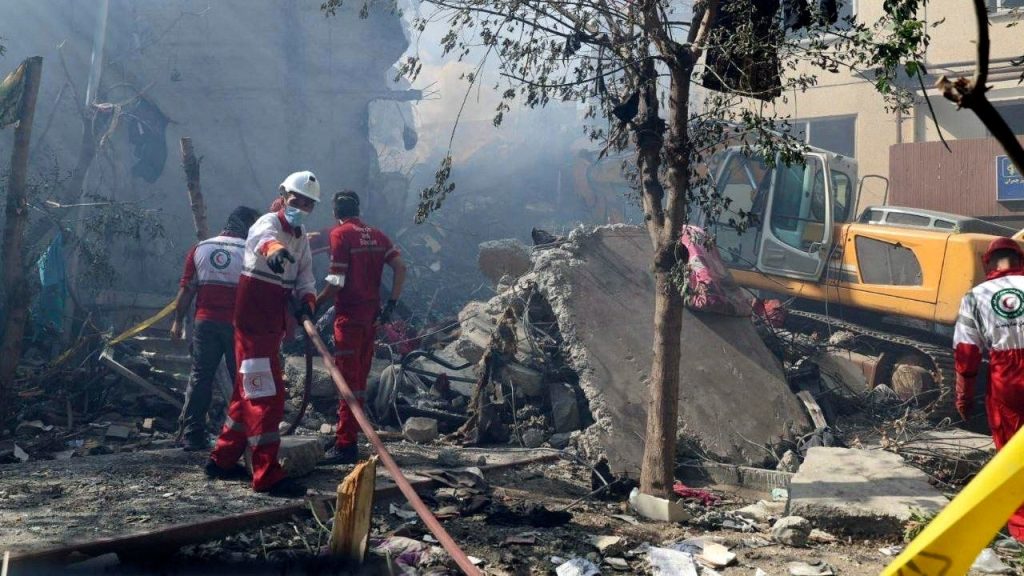In a recent escalation of tensions, Israeli officials have announced continued military operations against Iran under “Operation Rising Lion.” The operation aims to address the growing threat posed by Iran’s missile arsenal, which is expected to reach 8,000 within the next two years. An Israeli intelligence official revealed that key targets, including commanders of the Iranian Revolutionary Guard Corps, have already been struck, and further actions are anticipated to manage the ongoing threat effectively.
| Article Subheadings |
|---|
| 1) Overview of Operation Rising Lion |
| 2) Strategic Goals of the Operation |
| 3) Impact of Recent Airstrikes |
| 4) International Relations and Support |
| 5) What Lies Ahead for Israel and Iran |
Overview of Operation Rising Lion
“Operation Rising Lion” was officially launched by Israeli military forces in response to escalating threats from Iran. The initiative comes amid mounting concerns over Iran’s expanding missile capabilities. Israeli officials, including a senior intelligence source, revealed that Iran currently possesses around 2,000 ballistic missiles, but projections indicate that this number could rise dramatically to 8,000 in just two years. This growth has heightened fears regarding Iran’s potential to target not only Israel but other nations in the region as well.
Speaking to military analysts and reporters, the intelligence official stated, “We have more surprises coming up,” emphasizing the operational strategy’s dynamic and proactive nature. With the initial strikes deemed successful, Israeli military planners are evaluating further actions to ensure long-term security, aiming to remove any existential threats posed by Iran.
Strategic Goals of the Operation
The operation aims to achieve three primary goals: first, to dismantle Iran’s nuclear capabilities; second, to disrupt its ballistic missile program; and third, to neutralize the broader existential threat posed by the Iranian regime to Israel. These goals have driven Israeli actions over the last several weeks, with a focus on military precision and intelligence-driven operations.
A significant component of the strategy involved targeting key leadership figures within the Iranian military. The recent airstrikes reportedly resulted in the deaths of approximately 30 commanders engaged in coordinating missile strikes against Israel. Describing this development as a “historic achievement,” the Israeli intelligence official noted the importance of such victories in undermining Iran’s operational effectiveness.
Impact of Recent Airstrikes
Since the initiation of “Operation Rising Lion,” Israeli forces have successfully neutralized more than 40 Iranian air defense systems. This has provided Israeli aircraft greater freedom to conduct operations within Iranian airspace and significantly hampers Iran’s ability to retaliate effectively. Attacks have concentrated on both military and logistical targets, with a clear focus on crippling Iran’s capabilities to launch future offensives.
Israeli officials anticipate a continued barrage of Iranian missile launches in the coming days as a direct consequence of these operations, indicating an expectation of incoming attacks that could result in further casualties and destruction within Israel. The ongoing conflict underscores a higher stakes environment, with both sides prepared for an extended confrontation.
International Relations and Support
Internationally, the dynamics surrounding the Israeli-Iranian conflict have drawn attention, particularly regarding U.S. involvement. According to the Israeli official, the U.S. is “fully coordinated” with Israeli operations, indicating a strong alliance and shared strategic objectives against Iranian aggression. The implications of this collaboration extend beyond military support, reinforcing diplomatic ties and regional security cooperation.
The Israeli official emphasized, “The way the U.S. is standing beside Israel is unprecedented.” This statement reflects both the historical context of U.S.-Israel relations and the current geopolitical climate, suggesting a unified front against what many perceive as an encroaching threat from Iran.
What Lies Ahead for Israel and Iran
Looking toward the future, analysts speculate that the conflict could escalate further, depending on the responses from Iran. The Israeli intelligence official expressed confidence, suggesting that “we can finish it in days.” However, this optimism remains tempered by the realities of regional conflict, where the potential for escalation remains high.
With both sides gearing up for potential retaliation, strategists advocate for a balanced approach, the need for immediate action tempered by long-term diplomatic solutions. As Iran continues to face military pressure, its countermeasures may include heightened regional tensions or proxies stepping into the conflict, complicating already volatile circumstances.
| No. | Key Points |
|---|---|
| 1 | Israel’s “Operation Rising Lion” targets Iran’s missile capabilities. |
| 2 | Current Iranian missile arsenal is around 2,000; could rise to 8,000 in two years. |
| 3 | Israeli strikes have reportedly killed 30 Iranian military commanders. |
| 4 | U.S. military support remains crucial in Israeli operations against Iran. |
| 5 | Future outcomes depend heavily on Iran’s response to ongoing Israeli strikes. |
Summary
The escalating military tensions between Israel and Iran under “Operation Rising Lion” highlight a critical juncture in regional security dynamics. With a focus on crippling Iran’s missile threat and military infrastructure, Israel aims to ensure its long-term security. As developments unfold, the international community closely monitors the situation, given the potential for wider conflict fueled by retaliatory measures from Iran.
Frequently Asked Questions
Question: What is Operation Rising Lion?
Operation Rising Lion is an ongoing military initiative by Israel aimed at neutralizing the threat posed by Iran’s missile capabilities and military infrastructure.
Question: How many ballistic missiles does Iran currently possess?
Iran is estimated to currently possess around 2,000 ballistic missiles, but Israeli intelligence projects this could increase to approximately 8,000 within the next two years.
Question: What role is the United States playing in the current Israeli operations?
The United States is reportedly fully coordinated with Israel’s military operations against Iran, providing both strategic and diplomatic support in the conflict.


